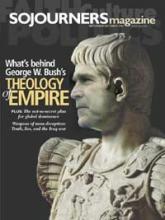In this issue Jim Wallis examines apparent recent shifts in President George W. Bush's theological framework and how those shifts may spur or sustain dangerous politics. While many of the administration's policies have thoroughly secular sources (see Duane Shank's related feature, "The Project for a New American Empire"), our commander-in-chief seems confident that these policies are spiritually sound, if not divinely ordained.
But, as theologian and ethicist Lewis Smedes once said, "bad theology kills." At the very least - in the hands of a president - bad theology can lead to bad, and often dangerous, foreign policy.
One trademark of Bush's foreign policy has been an apparent disdain for the United Nations - and especially for any U.N. action that involves the relinquishment of U.S. control. That tendency, as author Tad Daley explains, can be deadly in places like Africa, which the United States has often treated, at best, with benign neglect - even in the face of atrocities like the 1994 genocide in Rwanda. And while U.S. involvement in Liberia was much needed, it's also a tragic case of too-little, too-late. The situation provides a compelling argument for the establishment of an international force that's capable, and ready, to stop future atrocities before they happen.
That, at least, is a kind of pre-emption the world can live with - and perhaps can't live without.
- The Editors
Read the Full Article
